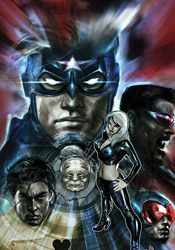
Marc Guggenheim and Francis Tsai's Vanguard is a good example of a fine concept that doesn't work within the format. By all indications, their story would've made for a good one-shot. Its cast is about as deep as possible, considering the length of its appearance, and the plot moves along briskly. So much so, in fact, that when its nine pages had passed me by, I was left with the impression that I'd missed something. This is an easy, visually impressive read that feels like it should have a bit more meat than it does. While it takes full advantage of one of the benefits of a lesser-known set of characters, switching allegiances and terminating faces at almost every turn, in the end I was left feeling empty.
With Ivan Brandon and Niko Henrighon at the helm, Machine Man has taken a playful new direction. Henrighon's light, manga-influenced artwork sets the tone early, and Brandon's odd concepts and offbeat pacing carry it the rest of the way. Yet I had a feeling that a lot of the time the story was just being weird for weirdness' sake, and while that makes for a nice change of pace, it isn't particularly easy to follow. When the storytelling and artwork manage to pull their act together for one beautiful two-page spread in the middle of the story, this creative pairing shows a lot of potential. It's the rest of the book, when the writing leaps and lurches around the page and the visuals show their inconsistency, which concerns me.
B. Claymore and Lee Weeks are up next, to introduce us to former Avenger and full-time oceanographer Stingray. More than any other, this single-issue tale is a great example of what can be done with a short page count and a simple idea. The former Avenger's run-in with an undersea monster is just long enough to feel substantial, but short enough to maximize what it's got without any padding. I'd been a critic of Weeks's artwork for years, but recently his style has matured, and this tale is just more proof of that fact. He displays a knack for fantastic action scenes, shows a touch of grotesque creativity in imagining the story's grotesque villain, and echoes the story's pacing with his compositions. This is the best work of the issue… it doesn't ask for more than five minutes of your day, and crams more into that confined space than many titles can manage in a three-issue arc.
Finally, Rich Koslowski and Marco Checchetto bring us the next-to-last chapter of Weapon Omega, which concerns itself with the Guardian, leader of Omega Flight. It's bad. Koslowski's writing is so verbose and stale; I was lost within just two pages. As the “great reveal” chapter, part eleven of twelve, the dialog just doesn't quit – this is basically one long, breathless narrative from a brainy female scientist and little else. Checchetto's artwork is given two or three opportunities to steal the show, but is largely relegated to talking heads. He doesn't exactly shine under the circumstances.
The more things change, the more they stay the same – and that's especially true for Marvel Comics Presents. Although it's been more than a decade since the first series was discontinued, the new run is virtually identical. It's still got those long, over-reaching 12-part storylines that can't hope to hold your attention in such short bursts. It's got its successes, few and far between, and its failures, more frequent than you'd imagine. This is really one good story, two mediocre ones and a single wretched failure. I can't recommend you do more than flip through it, and even in saying that I feel like I'm being generous.
Overall Score: 3

No comments:
Post a Comment